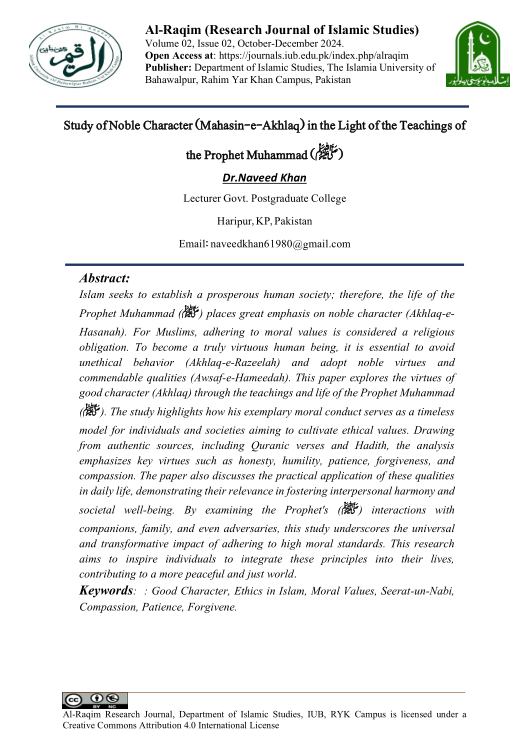Study of Noble Character (Maḥāsin-e-Akhlāq) in the Light of the Teachings of the Prophet Muḥammad (ﷺ)
Keywords:
Good Character, Ethics in Islam, Moral Values, Seerat-un-Nabi, Compassion, Patience, Forgivene.Abstract
Islam seeks to establish a prosperous human society; therefore, the life of the Prophet Muhammad (ﷺ) places great emphasis on noble character (Akhlāq-e-Ḥasanah). For Muslims, adhering to moral values is considered a religious obligation. To become a truly virtuous human being, it is essential to avoid unethical behavior (Akhlāq-e-Razīlah) and adopt noble virtues and commendable qualities ( Awsāf-e-Ḥamīdah). This paper explores the virtues of good character (Akhlāq) through the teachings and life of the Prophet Muhammad (ﷺ). The study highlights how his exemplary moral conduct serves as a timeless model for individuals and societies aiming to cultivate ethical values. Drawing from authentic sources, including Quranic verses and Hadith, the analysis emphasizes key virtues such as honesty, humility, patience, forgiveness, and compassion. The paper also discusses the practical application of these qualities in daily life, demonstrating their relevance in fostering interpersonal harmony and societal well-being. By examining the Prophet's (ﷺ) interactions with companions, family, and even adversaries, this study underscores the universal and transformative impact of adhering to high moral standards. This research aims to inspire individuals to integrate these principles into their lives, contributing to a more peaceful and just world.
References

Downloads
Published
Issue
Section
License
Copyright (c) 2024 Dr. Naveed Khan

This work is licensed under a Creative Commons Attribution-NonCommercial 4.0 International License.




